Flashes from the Muslim World
INDIA
COVID Warrior Dr. Asima Banu is BMCRI Principal
Dr. Asima was widely appreciated for her work as the nodal officer of the COVID war at the Trauma Care Center, Victoria Hospital, in 2020. Dr. Asima Banu, who has served at the Bangalore Medical College and Research Institute (BMCRI) for 23 years, took charge as the institute’s Principal.
Having finished her undergraduate and postgraduate degrees at BMCRI in the 1990s , she took charge as a faculty member in the microbiology department in 2000. Since then, she has served in various positions including as quality-in-charge and infection control officer.
MWL Chief Visits India
The Muslim World League (MWL) Chief has concluded a visit to India, where he addressed a conference with the country’s National Security Adviser in New Delhi. During his trip, Dr. Mohammed bin Abdulkarim al Issa met religious leaders of different faiths and led a congregation prayer and delivered a sermon at the historical Jama Masjid in New Delhi, one of the largest mosques in India.
“We know that Indian Muslims have contributed a lot to humanity. We know that they have a common objective of existing peacefully,” Al-Issa told the audience at the Indian Islamic Centre in New Delhi as he spoke about the MWL’s mission to promote peace, coexistence and tolerance.
A New Page in Jama Masjid’s History
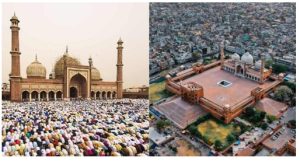 Built by the Mughal Empire some 400 years ago, the Masjid-e-JahanNuma in the city of Delhi, popularly known as the Jama Masjid, is among the largest, most beautiful and most cherished places of worship on the Indian subcontinent.
Built by the Mughal Empire some 400 years ago, the Masjid-e-JahanNuma in the city of Delhi, popularly known as the Jama Masjid, is among the largest, most beautiful and most cherished places of worship on the Indian subcontinent.
Although the complex can accommodate 85,000 worshippers, it was standing room only when Sheikh Dr. Mohammed bin Abdul karim Al-Issa, Secretary-General of the Muslim World League and Chairman of the Organization of Muslim Scholars, delivered the Friday sermon recently. Some of the facts of the Jama Masjid are as follows:
Old Name: Masjid-e-Jahan Numa (the mosque that reflects the whole world) | Location: Old Delhi, Delhi |
Date of Construction: 1644-1656 | Built by: Mughal Emperor Shah Jahan | Architect: Ustad Ahmad Lahori|
Capacity: 85,000 in total | Length: 40 meters | Width: 27 meters | Domes: Three| Gates: Three| Minarets: Two| Minaret height: 41 meters | Material: Red sandstone, marble | Cost: One million rupees
AFGHANISTAN
To Boost Carpet Production
Afghanistan is planning to boost carpet production throughout the country, its Ministry of Industry and Commerce said recently, with targets to employ 1.5 million people in the sector to meet rising demand, especially from China.
Afghan rugs are known for their quality and craftsmanship, but demand has taken a sharp dip since the Taliban’s takeover of Afghanistan.
In 2022, the Afghan carpet industry made a great achievement as exports reached USD20 million with production taking place in eighteen provinces and the sector employing more than one million people. The rising demand for Afghan carpets has benefitted local producers, with China considered an increasingly lucrative market.
BANGLADESH
Summons Swedish Envoy
Bangladesh summoned the Charged’ Affaires of the Swedish Embassy in Dhaka to protest against the burning of a copy of the Qur’an in Stockholm amid widespread international condemnation over the incident.
 The burning of the Qur’an outside a mosque in Sweden during Eid Al-Adha sparked outrage in many Muslim countries and condemnations of the Swedish authorities.
The burning of the Qur’an outside a mosque in Sweden during Eid Al-Adha sparked outrage in many Muslim countries and condemnations of the Swedish authorities.
“There is no logic to justify this sort of incident by saying ‘freedom of expression.’ It is a hate crime. Hate can’t be a freedom of expression,” the Swedish Charge d’Affaires was told.
SRI LANKA
Congratulates Kingdom on Successful Haj
Sri Lankan officials congratulated the Saudi leadership for the success of this year’s Hajj, as pilgrims from the island nation began wrapping up their stay in the Kingdom.
In the predominantly Buddhist Sri Lanka, Muslims constitute about 10% of its 22 million population. This year, about 3,500 of them performed the pilgrimage that is one of the five pillars of Islam. The Hajj season drew to a close after nearly 1.9 million Muslims from around the world performed its rites.
Qur’an Competition Opens New Chapter
Sri Lanka is entering a path of cultural diplomacy with Saudi Arabia, the island nation’s religious affairs minister told Arab News after the Kingdom hosted its inaugural Qur’an memorization competition in the country.
The event marked a new chapter of bilateral relations for the two countries. Hundreds of people took part in the competition with contestants coming from various Sri Lankan cities and provinces.
The Qur’an memorization competition may pave way for future cooperation in religious affairs between Sri Lanka and Saudi Arabia.
PHILIPPINE
Filipino Muslims Grateful for Kingdom
Philippine authorities congratulated Saudi Arabia’s leaders on the completion of Hajj season and expressed gratitude for the Kingdom’s efforts to facilitate the pilgrimage.
In the predominantly Catholic Phillipines, Muslims constitute roughly 5% of the population of 110 million. This year, nearly 7,500 of them performed the Hajj – the pilgrimage that is one of the five pillars of Islam.
Philippine authorities had put special measures in place to help Filipino Muslims departing for the Hajj. The measures included dedicated lanes in various airports across the country.
CHINA
Honors Chinese pilgrims
Makkah municipality leaders have hailed a group of Chinese pilgrims for keeping their camps at Arafat clean and picking up trash from a tunnel during Hajj.
Honoring the worshippers at his office, the deputy mayor of Makkah, Ibrahim Al-Ghamdi, thanked the pilgrims for their efforts in helping them to keep the holy sites tidy, recorded in a video that went viral on several social media platforms.
Through their actions, they set a wonderful example for everyone, demonstrating their refined behavior. Around 9,770 Chinese pilgrims performed the spiritual journey this year.
UNITED ARAB EMIRATES
A Hub for Dialogue and Harmony
A rabbi, a bishop and an imam walk into a room. It sounds like the start of a good joke. In fact, it represents a historic moment for interfaith relations that was brought about by the signing of the Document on Human Fraternity in February 2019.
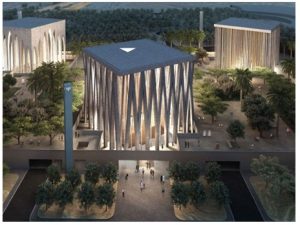 Signed by Pope Francis and Grand Imam of al-Azhar, Ahmed El-Tayeb, the document called on followers of the three Abrahamic faiths to create bonds of peace and dialogue. This led to the establishment of the Abrahamic Family House, which opened in Abu Dhabi in March.
Signed by Pope Francis and Grand Imam of al-Azhar, Ahmed El-Tayeb, the document called on followers of the three Abrahamic faiths to create bonds of peace and dialogue. This led to the establishment of the Abrahamic Family House, which opened in Abu Dhabi in March.
Featuring a synagogue, a church, and a mosque, each decorated with variations on the same pillars – zigzagged, straight and arched – the house gives each place of worship its own distinctive visual identity, while hinting at their many similarities.
In numbers, 75% of UAE residents are Muslims, 15% of UAE residents are of varied faiths and 10% of various Christian sects.
OMAN
Signs USD10bn in Green Hydrogen Deals
Oman’s Hydrom has signed agreements worth USD10 billion to develop two new green hydrogen production projects with a consortium  of South Korea’s Posco and French firm Engie, and Hyport Duqmininitiative, according to the country’s state news agency.
of South Korea’s Posco and French firm Engie, and Hyport Duqmininitiative, according to the country’s state news agency.
The new projects will be located in the Al Wusta governorate, Oman News Agency said.
The contracts tie into Oman’s plan to produce more than one million TPA of green hydrogen by 2030, increasing to eight million TPA by 2050. This will involve a cumulative investment value of USD140 billion.
SAUDI ARABIA
Wins Competition in Switzerland
 A Saudi pastry student and a chocolatier has won a competition for her chocolate creation in which she showcased AlUla’s Hegra– the Kingdom’s first UNESCO world heritage site.
A Saudi pastry student and a chocolatier has won a competition for her chocolate creation in which she showcased AlUla’s Hegra– the Kingdom’s first UNESCO world heritage site.
Speaking on her inspiration behind the showpiece, Khuolod Khalid said she was “astonished” by the massive human and natural heritage of Al Ula that “makes one feel so small in this big universe.”
The Chocolate Master Challenge was organized by the Culinary Arts Academy, Switzerland, under the theme ‘Winter Memories.’
Commemorates Hijrah Highway
Saudi artist, Shakir Samargandi, has curated a solo exhibition at Madinah Art Center titled ‘Stations’ to commemorate the Hijrah Highway – a vital link connecting the Kingdom’s two holiest mosques.
The road, winding between the sacred cities of Makkah and Madinah, is a stretch of asphalt over 400 Kilometers in length, designated to accommodate the daily migration of bustling travelers. His work translates the enduring power of the route’s legacy – Hijrah means migration in Arabic – and envisions tales the path has to tell.
“Stations” is an attempt to display the impact of development efforts that directly influence and affect the human experience when intangible concepts such as beauty and comfort are mixed with more practical concepts.
Makkah Exhibit Enhances Pilgrim Experience
The General Presidency for the Affairs of the Two Holy Mosques is taking part in the Hira Cultural District exhibition in Makkah. It has established a pavilion to highlight the advancements and improvements in the services provided at the Two Holy Mosques.
Furthermore, the Presidency is showcasing advanced technology and contemporary facilities designed to enhance the pilgrimage experience for visitors of the Two Holy Mosques.
OIC Urges Collective Action
The Organization of Islamic Cooperation (OIC) said that collective measures are needed to prevent acts of desecration against the Holy Qur’an and international law should be used to stop religious hatred after the holy book was burned in a protest in Sweden.
The Executive Committee of the OIC held a meeting in Jeddah to discuss the consequences arising from the Qur’an burning incident in front of the Central Mosque in Stockholm, Sweden, on the first day of Eid Al-Adha.
OIC member states united to denounce the incident with strong condemnation expressed by countries including Turkey, Pakistan, Cameroon and Gambia.
Free Daycare Center Opens at Grand Mosque
To create ease for pilgrims, a free nursery for children named “Child Care Center,” in the Grand Mosque opened within the mosque’s courtyard this year. The initiative was launched by the Development Committee of the Two Holy Mosques, led by the Royal Commission for the Holy City of Makkah and the Holy Sites, with funding from the General Authority for Awqaf and contributions from all government and security forces.
It is the first childcare center in the mosque to offer 24 hour services for pilgrims to help them perform their rituals in comfort and serenity. Only the first three hours are free. The Center includes three rooms and each contains games for various age groups.
UN Rights Body Calls for More Action
The UN’s top human-rights body overwhelmingly approved a measure calling on countries to do more to prevent religious hatred in the wake of Qur’an burnings in Europe, over the objections of Western countries who fear tougher steps by government would be trampling on the freedom of expression.
Applause broke out in the cavernous chamber of the Human Rights Council after the 28-12 vote, with seven abstentions.
Library Showcases Rare Manuscripts
The libraries and cultural affairs department of the General Presidency for the Two Holy Mosques is showcasing seven rare manuscripts in the women’s section of the Grand Mosque’s library in Makkah.
The rare manuscripts on display in the gallery include Qur’anic scripts written during the reign of Caliph Uthman bin Affan, paintings that feature Qur’anic verses by calligrapher, Mohammed Ibrahim, and a rare copy of ‘Musnad Al-Muwatta,’ the first legal work to incorporate hadith and fiqh.
Umaima bint Abdulrahman Al-Sudais, Head of women’s activities at the Department, said that the gallery aims to serve as a platform for people – from researchers to pilgrims – to broaden their historical and cultural knowledge.
Peaceful Countries in the Arab world
Five of the ten least peaceful countries globally are in the Arab world, according to the Global Peace Index 2023, which, nonetheless, said the Middle East and North Africa recorded some of the largest improvements in security and peace.
Yemen, Syria, Somalia, Sudan and Iraq were ranked 162, 161, 156, 155 and 154 respectively out of 163 countries. But Qatar, Kuwait, Oman and Jordan were ‘high’ in terms of peace, ranking 21, 35, 48 and 62 respectively.
The top three spots were held by Iceland, Denmark and Ireland respectively. Qatar maintained its rank as the most peaceful country in the region, a position it has held since 2008.
Unlocking New Partnership Potential
Arab gulf states and Central Asian countries cemented their political, security and economic ties during the GCC-C5 Summit, a gathering of leaders of the Gulf Cooperation Council member states and the Presidents of Uzbekistan, Turkmenistan, Kazakhstan, Tajikistan and Kyrgyzstan.
At the event which recently took place in the Saudi city of Jeddah, a Joint Action Plan for Strategic Dialogue and Cooperation between GCC members and Central Asian states was approved, covering the period from 2023 to 2027.
Soaring Demand for Halal Products
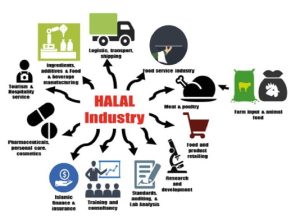 The growth of halal medicines, cosmetics and even sportswear, is fueling an economic boom that is reaching far beyond Saudi Arabia, and the wider Middle East.
The growth of halal medicines, cosmetics and even sportswear, is fueling an economic boom that is reaching far beyond Saudi Arabia, and the wider Middle East.
Global product launches with halal claims jumped by 19% from 2018 to 2020, from over 16,000 products to more than 20,000. Some 63% of these products have been reported to be coming from Asia, followed by Africa and the Middle East.
Halal is an Arabic word that means ‘permissible’ or ‘lawful.’ The opposite of halal is haram, which means ‘forbidden.’ There are now governing bodies that issue certificates to businesses certifying that their goods are, indeed, made according to halal procedures.
The halal industry was valued at USD1.27 trillion in 2021 and is projected to reach USD1.67 trillion in 2025. Saudi Arabia is now championing the halal industry because it is the largest consumer of halal products in the Middle East.
Taif’s Rich Culture and History Attract Pilgrims
Taif is one of the most beautiful and prominent tourist cities in the Kingdom, frequented by pilgrims due to its pleasant weather and rich cultural and historical sites, roses, and agricultural products.
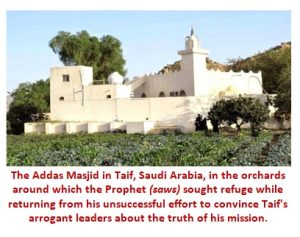 Less than an hour from Makkah, Taif is located at an elevation of 1,879 meters in the Hijazi Mountains, which are part of the Sarat Mountains.
Less than an hour from Makkah, Taif is located at an elevation of 1,879 meters in the Hijazi Mountains, which are part of the Sarat Mountains.
Visitors usually visit historical places such as Al-Abbas Mosque, Al-Madhoum Mosque, Al Hadi Mosque, Addas Mosque and Al-Kou’s Mosque and Shubra Palace Museum.
During the pre-Islamic period, the Quriash had orchards in Taif, the most famous of which was the orchard of the sons of Rabia, Utbah and Shaybah, and their servant Addas (who still has a mosque named after him to date).
PALESTINE
Pledge to Rebuild Jenin
Palestinian President, Mahmoud Abbas, vowed to rebuild the Jenin refugee camp during a rare and brief visit, a week after a deadly Israeli raid destroyed much of the camp in the occupied West Bank.
Abbas, 87, hailed the Jenin camp as an icon of struggle, during his first trip to the area in more than a decade, a period during which armed groups have gained popular support at the expense of his Palestinian Authority.
TURKEY
Qur’an Burning in Sweden Raises Questions
Turkey’s Foreign Minister said that Swedish authorities’ failure to prevent Qur’an burning protests in the country is raising security concerns and questions about Sweden’s credentials for possible NATO membership.
But Hakan Fidan, Turkey’s Foreign Minister, said Turkey would still approve Sweden’s membership in the military alliance if Stockholm ‘completes its homework’ and presses ahead with efforts to address Turkey’s concern.
SUDAN
A Worsening Medical Emergency
Hospitals across Sudan have been bombed, looted and occupied by armed factions since fighting broke out more than two months ago between the Sudanese military and the Rapid Support Forces, a paramilitary group.
As a result, millions of civilians are being denied vital healthcare. Medical supplies rapidly dwindled after the conflict began on 15thApril, with shipments of medicines and other medical supplies stolen or undelivered.
Meanwhile, scores, of health professionals have been killed, wounded or forced to leave the country. It is believed that less than 20% of health facilities in Khartoum are still operational.
RWANDA
Funds USD20m Electricity Projects
Saudi Arabia is providing a soft loan of USD20 million to fund an electricity project in Rwanda that would help boost the country’s social and economic development, the Saudi Press Agency reported recently.
The aim is to build a network of medium and low voltage lines and power distribution transformers for homes and government social services in Rwanda’s Kamonyi region.
It is expected that more than 60,000 people in the African country will benefit from the electricity provision. It would enhance various job creation projects in agriculture and other industries.
TUNISIA
Olive Oil Industry at Crossroads
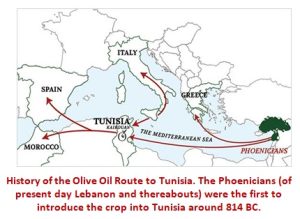 Tunisia, one of the world’s top five oil producers, is standing at a critical turning point. The country’s olive oil industry, which has long been a vital source of economic stability and foreign currency, is facing challenges that could determine its future.
Tunisia, one of the world’s top five oil producers, is standing at a critical turning point. The country’s olive oil industry, which has long been a vital source of economic stability and foreign currency, is facing challenges that could determine its future.
With the rise of super-intensive farming using Spanish olive varieties and methods, Tunisia has witnessed a surge in production levels and profits for big investors. However, this new-found success faces new obstacles.
Olive farming is deeply ingrained in Tunisia’s agricultural landscape with over 300,000 producers and approximately 1.7 million hectares of olive trees. This vast cultivation area covers 35% of Tunisia’s cultivable land, making it the most prominent agricultural occupation in terms of land use.
BRAZIL
The Women Fighting Islamophobia
As the number of Muslims in Latin America increases and Islamic communities gain visibility, more and more cases of Islamophobia are being reported in the region. Community leaders, most of them women, are striving to tackle the issue.
With a Muslim population estimated at between 800,000 and 1.5 million, Brazil is the only nation in Latin America where a comprehensive study on Islamophobia has been conducted.
Islamophobia is believed to exist just below the surface in many countries. Recent survey found women suffer higher rate of Islamophobia than men. Majority of incidents occurred on the street, in the work place or at school. Female respondents said they are often targeted for wearing the hijab.
GERMANY
Muslims Face Hate and Bias
Muslims face rampant discrimination in German society warranting concerted action to combat hate and bias, an independent commission assigned by the government said in findings released recently.
 Calling Muslims “one of the most under-pressure minorities,” in Germany, the panel presented recommendations to political leaders, police and educators as well as the media and entertainment sectors.
Calling Muslims “one of the most under-pressure minorities,” in Germany, the panel presented recommendations to political leaders, police and educators as well as the media and entertainment sectors.
“Many of the 5.5 million Muslims in Germany experience marginalization and discrimination in day-to-day life up to, and including, hatred and violence,” Interior Minister, Nancy Faeser, said after receiving the report.
She pledged that the government would intensively study the report’s findings and recommendations and work to fight discrimination and better protect Muslims from exclusion.
FRANCE
French Muslim Cycles Over 5,000 Kms to Perform Hajj
Nabil Ennasri, a French Hajj pilgrim of Moroccan origin, recently arrived in Saudi Arabia after covering a distance of over 5,000 kms by bicycle. He began his journey in Paris on April 22, and has crossed eleven countries including, Italy, Slovenia, Croatia, Montenegro, Bosnia and Herzegovina, Albania, Greece, Jordan and Turkey.
Ennasri is a French affairs analyst, writer, and civil society activist, focusing on a variety of social issues, including discrimination and education. Ennasri hopes that his trip will inspire other Muslims and community members to rethink their own approaches to travel.
[COMPILED BY: SYED NEHAL ZAHEER]

